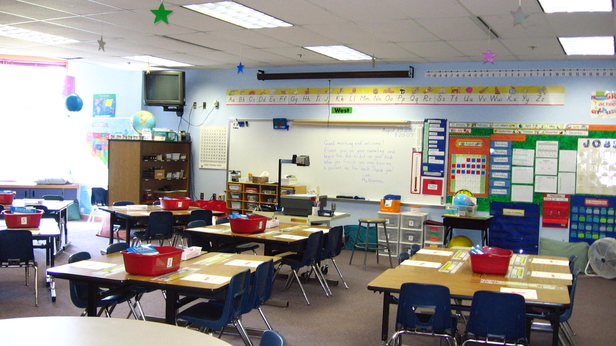
Walker Proposes Statewide Expansion of Vouchers, Charter School Authorizing Board, and A-F Grades in 2015-17 Budget Address
by Christian D’Andrea
MacIver Institute Education Policy Analyst
Governor Scott Walker did not shy away from educational reforms in his 2015 State Budget Address. The second-term administration proposed sweeping changes that included a statewide school voucher program, A-F grades for all publicly funded schools, the creation of a statewide independent charter school authorizer, and a $141.9 million per-pupil funding supplement in 2016-17.
That’s a lot to process, so let’s just get down to brass tacks. Here are the major reforms that Gov. Walker unveiled in his 2015 Budget Address:
Voucher Expansion
Walker’s biggest announcement was the creation of a new statewide school choice program that would allow students throughout Wisconsin to attend the private school of their choice through a state-funded voucher. It will run alongside – and prospectively sunset – the Wisconsin Parental Choice Program, (WPCP) which was created in 2013 but limited to only 1,000 students per year. However, the new, as-of-yet-unnamed voucher program would have one major difference from the current statewide system.
These new vouchers will only be made available to students who are currently attending public schools – a caveat that allays concerns that the majority of WPCP students had previously attended private schools before accepting state funds. These students must come from families that earn less than 185 percent of the federal poverty limit – $44,122.50 for a family of four last year. Any private school wishing to accept voucher students would also have to consent to the state’s school accountability program and receive grades through the Department of Public Instruction’s (DPI) School Report Card formula.
That’s a significant reform in Wisconsin – a state that was the birthplace of modern school choice. A statewide program aimed at underprivileged students that are currently attending public schools will help expand educational options for the pupils that need them the most.
Tweaking the School Accountability Formula
Walker’s accountability plan doesn’t make many major changes like the Assembly’s punitive regulations, but it does offer some significant differences in how the state will measure school performance in all publicly funded institutions in Wisconsin. These schools would now be given A-F grades to denote their performance in a given year – something that the DPI and several district administrators had testified against in public hearings this year and last. Schools that earn a “D” or “F” grade would be compelled to send a list of other nearby schools – traditional public, charter, and voucher – and their Report Card grades home with their students so that parents can better understand their educational options.
The new accountability program would also weight student grades based on the amount of time they spend in their school. As a result, the test scores of a student who has attended his or her school for just one year would have a smaller impact on the school’s overall score than a student that has attended that school for three years or more. Students that have just transferred in to their school and have been there for less than one year would not count in DPI’s assessment. There are also weights in place to help schools with large populations of low-income students balance traditionally low standardized test scores on these Report Cards.
Walker’s plan would also allow schools increased flexibility in choosing the standardized test by which they are graded. The University of Wisconsin Value Added Research Center (VARC) will create a list of authorized, normed tests from which school districts, charter, and voucher schools can choose. Those tests would be processed by VARC to create a balanced system of measurement for all publicly funded schools.
A Statewide Charter School Authorizer
Walker’s call to add a statewide charter school authorizer may get lost behind the voucher expansion headlines, but it’s a step forward in expanding the presence of independent charter schools across the state. The state’s Charter School Oversight Board will allow for the creation of more of these public schools – schools that have consistently outperformed their MPS peers in Milwaukee. The board will provide a supplemental source of governance for schools outside of their local school board for educational stakeholders who want to create meaningful alternatives in K-12 education.
Eleven appointed members would oversee these public schools. They would be in charge of not only authorizing charters but also holding them accountable. The Budget in Brief suggests that only nonsectarian, nonprofit groups will be eligible to apply for these charters.
Funding
The 2015-17 budget featured several changes in K-12 funding levels. This included:
• Supplementing per-pupil aid by a total of $141.9 million in 2016-17 after keeping funding levels static in 2015-16. This is less growth than in the last budget cycle, when $289 million was sent to traditional public schools over that two-year span. Essentially, this would not renew the $75 per student per year increases that occurred over the two years of the last budget cycle in 2015-16. $75 per student would be added back to that fund in 2016-17.
• Increasing rural school funding (through sparsity and high-cost pupil transportation categorical aids) by $13.2 million over two years.
• Providing $105.6m each year to fund the school levy tax credit and $104.1m in 2016-17 for equalization aids to maintain revenue limits despite property tax relief.
This unveiling was an ambitious one for education policy in Wisconsin. Walker is primed to expand school choice to new heights by increasing access to school vouchers and independent charter schools in the Badger State. These significant reforms will be a cornerstone for debate at the Capitol this spring, and it’s a certainty that Tuesday’s announcement will bring plenty of stakeholders to testify – both in favor and against – in Madison. Should these changes become law, it will mark a new era of school choice in Wisconsin, but there’s still plenty of ground to cover before anything becomes official.